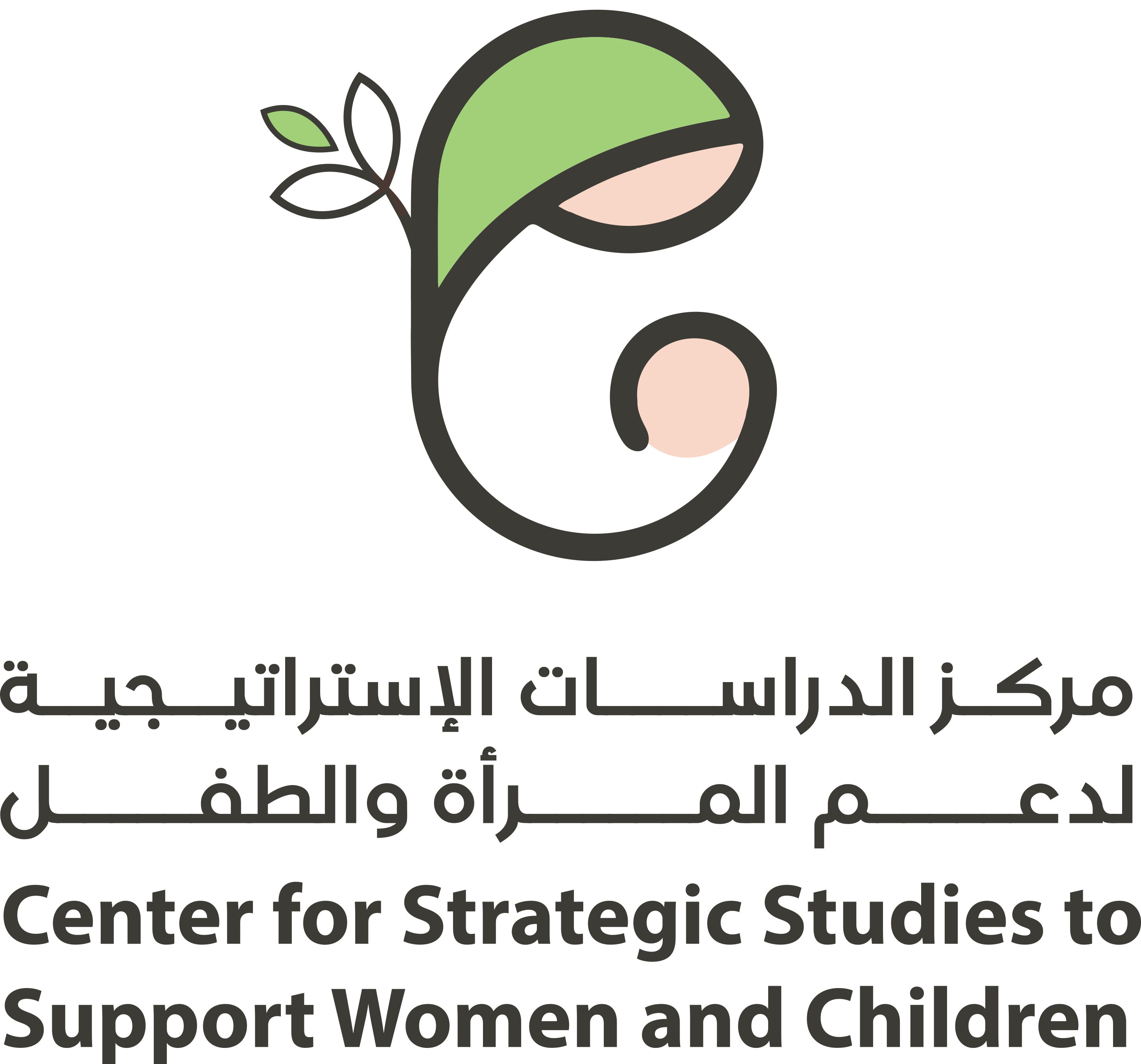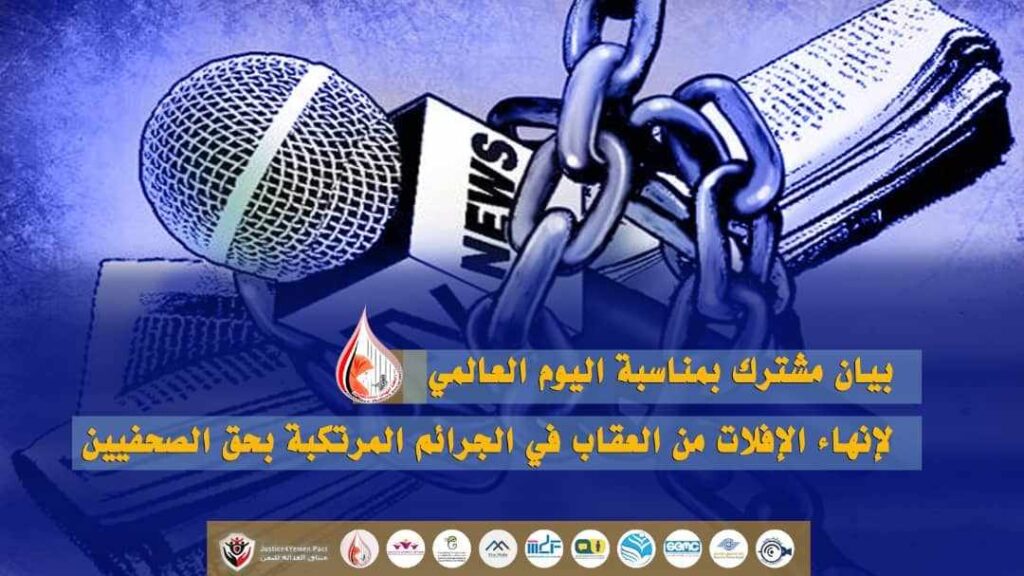A joint press release on the International Day to End Impunity for Crimes Against Journalists
2023-11-02
Yemen: Crimes against Journalists Go Unpunished
Ending impunity for crimes against journalists is one of the most important issues to guarantee freedom of expression and access to information for all citizens. It is noticeable that the conflicting parties in Yemen differ in almost everything, but they agree on silencing the press and preventing journalists from freely exercising their work. Impunity leads to more killings and is often a symptom of worsening conflict and the breakdown of law and judicial systems. Protecting the press and respecting the valuable role should be a higher priority.
On the anniversary of "International Day to End Impunity for Crimes against Journalists", the signatory organizations of this press statement agreed that journalism in Yemen has become one of the most dangerous professions. They emphasize that over the last nine years, journalists were among the most targeted groups by all the conflicting parties; as they were victims of various crimes and violations, including killings, arbitrary detention, torture, and unfair prosecution. Unfortunately, none of the perpetrators has been brought to justice.
Over the last nine years, freedom of expression and press freedoms in Yemen have deteriorated because of the dangers and risks facing journalism. Since 2014, Yemen has been recorded as one of the worst countries for violating the rights of journalists and people working in media, according to Reporters Without Borders (RSF). Journalists remain among the most at-risk groups. Those risks range from assassination, extrajudicial killing, targeting, arrest, imprisonment, and enforced disappearance, to torture and abuse in all its forms, and to varying degrees, by the internationally recognized Yemeni Government, the Houthis, the Southern Transitional Council (STC) and other armed groups. All the violations show one consistent trend: all conflicting parties in Yemen seem to agree to silence the press and prevent journalists from freely working on the ground.
For many years, journalists in Yemen have faced increased violence, intimidation, and murder. We have repeatedly and strongly condemned the journalists' lack of protection to carry out their work safely and freely, whether they cover organized crime, political affairs, corruption, or armed conflict.
In fact, every year, since 2015, there has been a rise in the number of journalists killed. We have repeatedly highlighted that it is important and essential to strengthen the legal framework for the protection of freedom of expression. Several local organizations have documented the killing of 54 Yemeni journalists, including at least two women journalists, at a rate of more than 5 journalists per year. These killing incidents range from assassination to targeting during the armed conflict due to covering news and publishing information to the public. These figures do not include the many journalists who are subjected to numerous non-fatal attacks such as torture, enforced disappearance, arbitrary arrest, intimidation, and harassment. Journalists and other human rights defenders are silenced in other ways, including misuse of defamation and anti-terrorism laws. They were also accused of publishing "fabricated news" and subjected to cyber harassment.
For every fifty-two (52) killings out of (54) documented, the murderers have gone unpunished, and the victims were denied reparations. For example, according to the January 2019 report of the Panel of Experts on Yemen the first systematic murder of a Yemeni journalist was the murder of the investigative journalist Mohamed Abdu Al-absi, who was killed in December 2016, in Sana 'a. He was preparing an investigative report about the involvement of the Houthi leaders in fuel import corruption to finance the ongoing conflict. The Director-General of UNESCO has called for a thorough and independent investigation into Al-absi's murder, which never took place. The Defense Attorney stated that the authorities of the Houthis in Sana 'a were reckless with the case, as it took 3 years to collect evidence before the case was submitted to the Western Sana 'a Prosecutor's Office, which refused to open an investigation into the case and summon the defendant, although it did submit certain documents in the case. Seven years later, in November 2022, the prosecutor's office decided to dismiss the case due to insufficient evidence.
Since 2020, the systematic assassination of journalists has escalated, and many of them have been silenced by killing. For example, Japanese television correspondent "Saber al-Haidari" was assassinated by an explosive device attached to his car in Aden governorate in June 2022, Press photographer Foaz al-Waif was killed in his car in March 2022, in Taiz governorate. Also, the journalist "Rasha al-Harazi" was assassinated in November 2021. AFP press photographer Nabil al-Quaiti, was assassinated by unidentified gunmen who shot him in June 2020, in Aden governorate. Moreover, there are more journalists who have been prosecuted and censored through other forms of intimidation.
The signatory organizations have separately condemned all these crimes against journalists. However, both the de-facto authorities of the Houthis and the internationally recognized Yemeni government have systematically failed to conduct impartial investigations to hold those perpetrators accountable.
Therefore, this impunity must end, and the UN should put pressure and call on the parties to conflict in Yemen to take careful, effective, and immediate actions to end impunity for all crimes committed against journalists, hold perpetrators accountable, and stop the cycle of violence that undermines the safety of journalists in the country.
We have repeatedly stressed that it is important and essential to strengthen the legal framework for the protection of freedom of expression, and the signatory organizations have separately condemned all violations committed against journalists in Yemen, as well as the lack of guarantees for press freedom in Yemen.
Today, with one voice, we call on the Yemeni government and the Houthis to immediately halt the increasing violations against journalists, women journalists, activists and media workers, and to apply the Law in order to safeguard rights and freedoms and prevent impunity for murderers who aim to hide the truth and terrorize media workers.
We call on the parties to the conflict to allow the Special Rapporteur on Freedom of Expression to report the increasing levels of violence and to propose solutions to address impunity. In light of this experience, we urge the parties to conflict to make a sincere commitment to meaningful dialogue and the implementation of effective solutions for the profession of journalism, before the freedom of expression environment deteriorates further.
The signatory organizations emphasize that the relative authorities should take certain measures through the below actions:
To urge an immediate and serious investigation in order to establish practical and effective mechanisms to end impunity for crimes against journalists in Yemen.
It is necessary to establish an independent international and local joint committee to investigate crimes against journalists committed by all parties.
Calling that the Yemeni Government, the Houthis, and the relevant law enforcement institutions work diligently to bring to justice those who have committed crimes against journalists and that the perpetrators do not remain unknown.
Calling all concerned parties to adequately protect journalists so that they can fully do their jobs.
Adoption of the recommendations of the UN Plan of Action on the Safety of Journalists and the Issue of Impunity.
Conducting effective, prompt, thorough, impartial, independent, transparent, and true investigations into all cases of killings and assassinations of journalists and bringing those involved in such violations to a fair trial.
Immediate release of journalists who have been arbitrarily arrested, have served their sentences, or faced violations of due process of law.
To bring the cases of detained journalists before the Press and Publications Court for adjudication in accordance with international standards, and not prosecuting journalists in specialized state security procedures.
Cease all actions that restrict journalists and refrain from issuing decisions or actions that impair their ability to perform their journalistic duties.
To stop exploiting journalists and women journalists to work without clear contracts that guarantee their rights and to not endanger them. And to prohibit all forms of reprisals against journalists and women journalists due to their exercise of the right to opinion and expression.
Ensure that all journalists and media outlets are able to work freely and independently.
Thursday 2 Nov 2023
The Signatories:
European Arab Center for Human Rights and International Law
Studies and Economic Media Center (SEMC)
Free Media Center for Investigative Journalism
Yemeni Media Freedom Observatory (YMFO)
The National Organization of Yemeni Reporters (Sada)
Abductees' Mothers Association
National Organization for Defending Rights and Freedoms (HOOD)
American Center for Justice (ACJ)
Yemen Future Foundation for Culutre and Media Development
Association Ma`onah for Human Rights and Immigration(AMHRI)
Albelaad center for studies and media
ALK arama – Geneva
Human Rights Information and Training Center
Watch for Human Rights (Watch4HR)
SAM Organization for Rights and Freedoms
Rights Radar for Human Rights
The Yemeni Coalition for Monitoring Human Rights Violations (Rasd Coalition)
Social Peace Promotion and Legal Protection
Center of my Right for Support the Rights and Freedoms
Forum for Development and Human Rights Dialogue
Geneva International Centre for Justice
International-Lawyers - Org
Defense Foundation for Rights and Freedom
League of Women for Peace
YemenWomen Journalists Network
Yeni Yemen Media Foundation
The Electronic Foundation for Humanitarian Media
Dameer Foundation For Human Rights
Al-Amal Women’s and Sociocultural Foundation
Center for Strategic Studies to Support Women and Children (CSWC)
Musaala Organization for Human Rights
Mansa Foundation for Media And Development Studies
Media Sac for Media and Development
Cultural Media Center
Media village for development and Information
Mirrors Media For Development Center MDC
Qarar foundation for Media and Development
Wujud Foundation for Human Security
Yeni Yemen Media Foundation
Musawah Organization For Rights and Freedoms
TO BE Foundation For Rights &Freedoms
Monitoring Journalist Network
Wujud Foundation for Human Security
Sawasia Organization For Human Rights
Humanitarian Journalism Foundation
Yemen Without Conflict Organization
Alakhar For Peace And Development center
Rescue foundaton for development
Bahth Foundation for Development and Human Rights
Yemeni Legal Center
Sent from myMail for Android
2023-11-03

